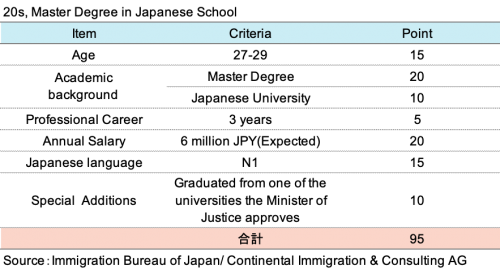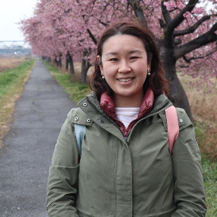Japan Permanent Residency for Highly Skilled Professionals | How to Apply with 80 Points
 If I have 80 Highly-Skilled Professional (HSP) points or more, can I apply for permanent residence (PR) in Japan for only 1 year stay?
If I have 80 Highly-Skilled Professional (HSP) points or more, can I apply for permanent residence (PR) in Japan for only 1 year stay?
 If you have more than 80 HSP points, by degrees such as MBA, professional career and annual income, you can apply PR after 1 year your stay.
If you have more than 80 HSP points, by degrees such as MBA, professional career and annual income, you can apply PR after 1 year your stay.

1. Permanent Residence for Highly Skilled Professional (people)
2. What is Highly Skilled Professional?
3. Who meets the HSP-PR Criteria?
4. Requirements for Highly Skilled People PR Application
5.Required Income for Permanent Residency of Highly Skilled People
6.Guarontor for HSP-PR
7.Examination Period for HSP-Permanent residence
Permanent Residence for
Highly Skilled Professional (80 points +)
What Is the Highly-Skilled Professional Points?
The Highly-Skilled Professional (HSP) visa is designed to attract foreign talent with specialized skills in fields like research, technology, and business management. It assigns points based on academic qualifications, professional experience, income, and other factors. Individuals who accumulate 80 or more points may qualify for permanent residency after only one year of residence in Japan.
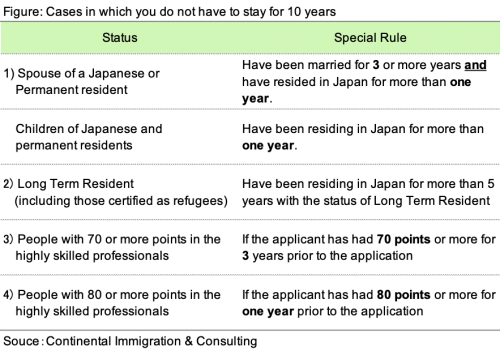
Can You Apply for Permanent Residency Without HSP Status?
Even if you do not currently hold an HSP visa, you can still apply for permanent residency if you score 80 or more HSP points. This flexibility applies to those on other visas, such as the Engineer Visa or Spouse Visa, as long as you meet the point criteria at the time of application and one year prior.
Key Requirements for Permanent Residency Application
To apply for PR, you must meet the following two conditions:
Requirement
①Have 80+ points at the time of application for PR
②Have 80+ points 1 year prior to applying
80+HSP calculated when applying & 1 year prior to applying
The HSP points are calculated based on factors such as education, professional experience, annual salary, and Japanese language proficiency. For example:
- Academic Background: A PhD earns 30 points, an MBA 25, and a Bachelor’s degree 10.
- Professional Career: 10 years or more of experience earns 20 points, while 5 years earns 10 points.
- Annual Salary: An annual income of 10 million JPY or more adds 40 points.
- Japanese Language Proficiency: JLPT N1 provides 15 points, while N2 provides 10 points.
Even if you hold a visa other than HSP, such as a Professor, Researcher visa or Engineer Visa, you can still qualify as long as you meet these criteria.
You can obtain Permanent Residencu status after only 1 yeay stay in Japan, when you meet 80 points+ at the time of application and 80 points+ at 1 year before your application. In the following, we will provide examples in the case of HSP(1b) . Once again, you are eligible even if your current visa is not a Highly Skilled Professional visa, but a Professor, Engineer, or Spouse visa.
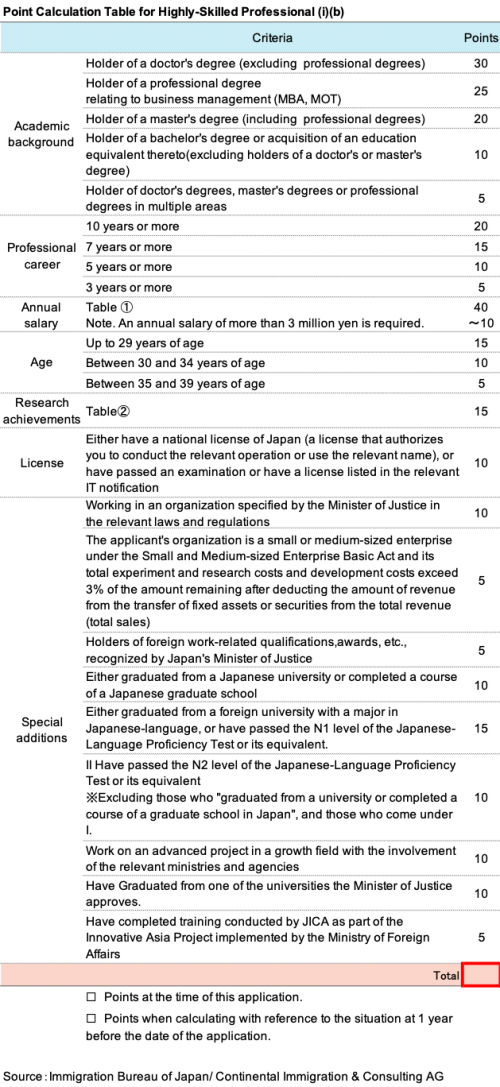
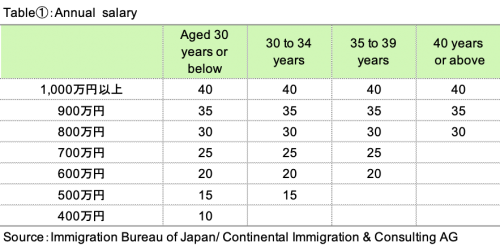
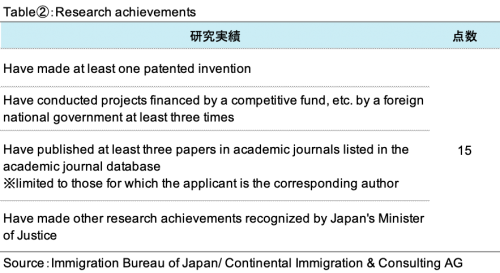
Criteria to HSP Point calculation
The main items that receive points for calculating HSP points are (1) academic background (degree, MBA), (2) professional career, (3) annual income, (4) age, and (5) Japanese language skills. The higher your degree is, the more points you will get. More points are awarded for longer work experience, higher annual income, and younger age. In addition, points are awarded for Japanese language skills if you have the N1(JLPT) and if you have graduated from a Japanese university.
To put it simply, graduates of Japanese university with JLPT N1, people with a master’s degree or higher, graduates of top universities, and IT Engineer are more likely to score more than 80 HSP points.
Who meets the HSP-PR Criteria?
【CASE1】20s, Master Degree (Japanese Top School), Salary:6 million JPY
A Young Professional in Their 20s with a Master’s Degree
A 20-something holding a Master’s degree from a Japanese university and earning a salary of 6 million JPY could accumulate significant points. While young professionals may have shorter career histories, their academic qualifications and high-income positions, particularly in industries like IT or finance, often help meet the 80-point requirement.
Mid-Career Professional in Their 30s with a Bachelor’s Degree and High Salary
A professional in their late 30s with over 10 years of experience and an annual income of 10 million JPY may also meet the criteria. Despite having a lower score for academic qualifications compared to someone with a Master’s degree, the combination of experience, income, and potentially additional qualifications like Japanese language skills can make up the difference.
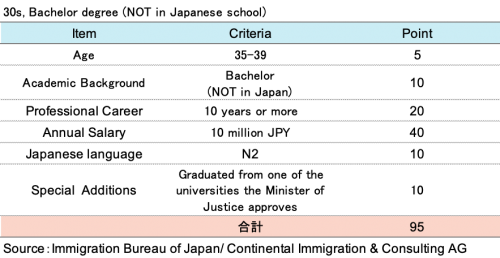
Criteria other than HSP points
Achieving 80 points does not automatically guarantee PR. Applicants must also meet other criteria:
① Good Conduct and Legal Compliance
②Financial Stability
③Benefits to Japan
④Guarantor Requirement
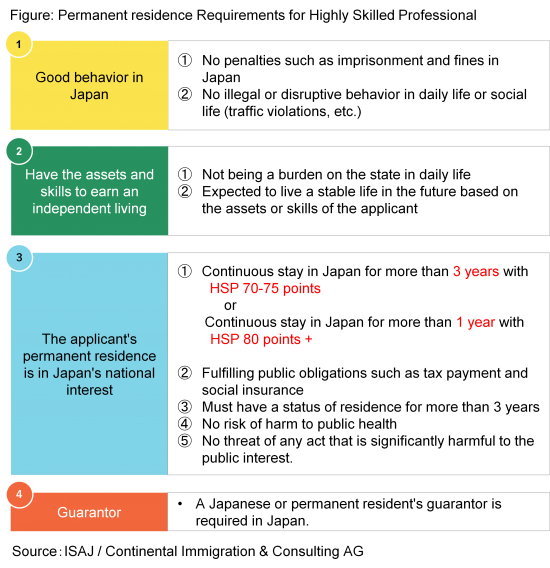
(1) Good Conduct and Legal Compliance
Applicants must demonstrate good moral conduct and compliance with Japanese laws. Minor violations, such as traffic offenses, may affect the outcome if they occur repeatedly.
① No legal penalties have been imposed for violating the laws of Japan
The requirement is that no legal penalty has been imposed in violation of Japanese law. It is necessary that at least 10 years have passed since the imprisonment ended. Five years must elapse after the postponement period has expired.
In the case of a fine, if five years have passed since the payment of the fine, etc., it will not be treated as having been punished in violation of Japanese laws and regulations. In addition, it is necessary that protective actions under the Juvenile Law are not ongoing.
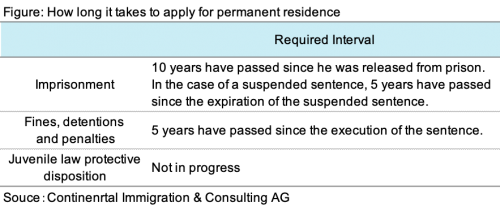
②No minor illegal acts or harassment to society
The requirement is that you do not repeatedly make minor violations of the law that do not constitute a legal penalty or inconvenience the community. Includes fines for traffic offenses and overwork of family members staying on a family visa.
Traffic offense
The penalty for traffic offenses is not a legal penalty, but if you repeatedly pay the penalty, you are repeatedly committing illegal activity. At present, it is difficult to estimate the number of traffic violations etc. in the examination process at least 5 times in the past 5 years and at least 4 times in the past 2 years. For example, it is not often memorized that a ticket was illegally locked due to parking prohibition, so you can get a driving record certificate at a police station and check it.

(2) Financial Stability | Sufficient assets or income
When you change jobs
f you change jobs, the Immigration Bureau may disallow permanent residence because of your lack of stability. Therefore, it is recommended that you apply for permanent residence about one year after you change jobs. Please note that many foreigners change jobs in a shorter period of time compared to Japanese to improve their career.
Note:Changing jobs before or after applying for permanent residence
Dependents
If there is no dependent family, the income of 3 million yen per year is a guide, but it is necessary to add about 700,000 to 800,000 yen per year for each additional dependent family. For example, if a man has a wife and a child, the annual income will be about ¥ 4.4 million to ¥ 4.6 million for 3 million yen + 700,000 to 800,000 yen x 2 people.
(3) Benefits to Japan
Permanent residency must align with Japan’s national interests. This requirement generally includes a continuous stay of at least one year with 80+ HSP points and meeting all public obligations, such as timely payment of taxes and social insurance contributions.
①Must have HSP points of 80+ and have been residing in Japan for more than one year continuously.
The following people fall into this category.
- Applicants who have been living in Japan for more than 1 year with “HIGHLY SKILLED PROFESSIONAL (a), (b), or (c) status (80 points or more)”.
- Applicants who have resided in Japan for more than one year and who have scored more than 80 HSP points based on a year prior to the date of application for permanent residence.
Applicants residing on a work visa who have met 80 or more points in the HSP calculation for more than a year are eligible.
②Public obligations such as tax payment and social insurance
Taxes such as income tax, resident tax, and corporate tax, as well as pensions such as employee pensions and national pensions must be properly paid and not payable. In addition, they are not asking whether you paid the final payment, but rather whether you are paying on time. If you have not paid taxes or pensions, or you have paid but have not paid by the due date, you will not be allowed.
If you do not pay within the payment deadline
If you fail to pay on time, you must have a record of legal payment for the next 1 year after you pay the outstanding amount. You will also need to explain to the immigration authorities why you failed to pay on time and how to prevent a recurrence. Recurrence prevention measures include the use of bank direct debit or credit card payments.
To begin with, if you are not a member of the National Pension System, you must join the National Pension System, pay your outstanding payments and keep a record of your membership for 1-2 years.
Number of legally dependent families
In order to pay taxes, you must be properly dependent on tax law. If a relative who is not originally permitted under tax law is being supported for the purpose of reducing tax payments, permanent residence is not permitted because he / she does not fulfill the appropriate tax obligations (= tax evasion).
③3 or 5 years Visa are Required
Highly-Skilled Professional (HSP) residency status is granted for five years. However, if you have a status which is not HSP, your current status of residence must be for three years or more. If your current status is less than three years old, you must change your status to HSP before you can apply for permanent residence.
④There is no risk of harm from a public health perspective.
Specifically, you must not be addicted to drugs, marijuana, or stimulants, and you must not have contracted any infectious diseases such as Ebola hemorrhagic fever or plague.
⑤It is recognized that there is no risk of committing an act that is materially harmful to the public interest.
The content here is similar to the requirements for conduct in (1).
(4)Guarantor Requirement
Applicants must secure a guarantor (called Mimoto hosho nin, 身元保証人) who is either a Japanese national or a permanent resident. The guarantor’s role is moral rather than legal, but they must be financially stable and have paid their own taxes.
Responsibilities of guarantor
The guarantor’s guarantee consists of three parts: 1) payment for accommodation expenses, 2) payment for return expenses, and 3) legal compliance of the applicant.The guarantor under the immigration law is morally responsible and has no legal responsibility.In other words, there is no legal obligation to pay the applicant’s stay and return expenses, and he is not responsible for overseeing any violations of the applicant.
However, a guarantor that has failed to fulfill its moral obligations to the applicant will no longer be able to become an guarantor for another permanent resident application.
(For your reference:How to asking for a guarantor for a permanent residence application)
Examination period from application to permission
The standard examination period for PR applications is around 8–10 months, though this can vary depending on your specific case and the office where you apply. Delays may occur, and stricter screening procedures have led to a lower approval rate in recent years.
FYI:PR application with your family
FYI:How to speed up PR examination period
Our Insight : Maximizing Your Chances for Permanent Residency
For those scoring 80 or more Highly-Skilled Professional points, the path to permanent residency in Japan is significantly expedited. However, the process remains rigorous, with strict checks on conduct, financial stability, and contributions to Japan’s national interests. Consulting with immigration professionals can help you navigate this complex process smoothly.
For expert assistance with your permanent residency application, contact Continental Consulting.
FYI: See your situation(Self check)
FYI: Japan PR Approval rate?
FYI: How to write RIYUSHO for Japan Permanent Residence?
Fee for HSP-PR:170,000 JPY (Including Tax: 187,000 JPY)
Obtaining the Japanese government Documents and new residence card on behalf of you :+50,000 JPY including document’s costs
Professional
 Masakazu Murai
Masakazu Murai
Immigration consultant, Financial advisor
18 years experience in Investment Banking at Mitsubishi UFJ Morgan Stanley. He had provided financial advisory more than 500 entrepreneurs and senior management.
During his tenure, he worked as an employee union executive committee member in promoting diversity, including the active participation of foreigners and women in the workplace, and engaged in activities to improve the working environment. He specializes in consulting and financial consulting on the status of residence for foreigners.
Gyoseishoshi Immigration Lawyer
CMA(Japanese financial analyst license)
CFP (Certified Financial Planner)
Master of Business Administration in Entrepreneurship

